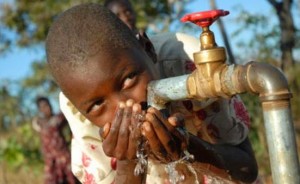African countries told to rise up to mitigate looming water insecurity
 African countries have been alerted on the threat of water insecurity as climate impacts intensified globally, and urged to coordinate efforts at the local and national levels to properly manage their water sources.
African countries have been alerted on the threat of water insecurity as climate impacts intensified globally, and urged to coordinate efforts at the local and national levels to properly manage their water sources.
Experts say when this is done, it would help the Continent to adapt to the impacts of climate change, which is already having a high toll on Africa evidenced by the long droughts and flooding.
Water insecurity and climate change have been noted to be the two most critical crisis the world would face over the decades, as the water cycle is already affected by global warming, threatening societies, energy and food security as well as economic growth and numerous Sustainable Development Goals.
For the African region, experts have identified the impacts of climate change as strictly connected to water as manifested through floods and droughts and, therefore, called for cross-cutting efforts for climate change adaptation, mitigation and resilience.
At a UNESCO side-event held along the Climate Chance Summit-Africa 2019, which started on Wednesday in Accra, various speakers emphasised the need for countries to unite in efforts to address water scarcity.
The three-day Summit is dubbed: “Stepping up Local Climate Action in Accra”, while the UNESCO theme is: “Strengthening Coordinated Water and Climate Actions in Africa.”
It brought together stakeholders from the water and climate communities to discuss how water could contribute to climate change adaptation programmes and how partnerships could be strengthened among countries.
Mr Diallo Abdourahamane, the Head of UNESCO National Office in Ghana, said the Organisation recognised water as a critical commodity, hence the UNESCO’s World Water Assessment Programme collaborating with its partners to organise the side-event.
He said managing water resources vis-à-vis the impact of climate change was very complex and, therefore, required an interdisciplinary approach to addressing it.
“As a Continent, Africa needs to pool together its intellectual and technical capacity to address these challenges.”
Mr Abdourahamane said one of the key messages from the regional evaluation called on African leaders to acknowledge and invest in stronger links between SDG-6 and the other water-related goals to lift millions of people from poverty and achieve the African Water Vision 2025, the 2030 Agenda and the African Union Agenda 2063.
“Indeed, without clean water and sanitation, we cannot attain sustainable cities and communities, which is Goal 11. Without access to clean water, our girl-child will continue to travel longer distances in search of water instead of being in school.”
“Therefore, our dream of attaining equitable and quality education for all and gender equality, which are Goals 4 and 5 respectively, will not become a reality.”
Dr Stephen Maxwell Kwame Donkor, an International Water Management Consultant, said water was so critical that Africa should not downplay it as many water sources in Africa were being polluted and dwindling as the population increased.
He urged Ghana to learn from other African countries like Ethiopia who had gone through long droughts over the past 15 years but had taken irrigation seriously and other measures critically to address the problem.
“Ghana should have a long term water development plan, which will survive the NPP and the NDC. It’s about the survival of the people otherwise we will soon be paying twice and thrice of the price of water we are paying now,” Dr Donkor said.
That called for more innovative ways in mobilising domestic resources to fund water and sanitation issues, he said.
Mr Patrick Yaw Boamah, the Deputy Minister of Water Resources and Sanitation, said the Ministry was established to specifically focus on water and sanitation issues with an eye on SDG-6, which talks about addressing those problems.
He said other ministries like the Environment, Science, Technology and Innovation were to coordinate activities bordering on climate and environment.
He emphasised the need for proper coordination of agencies and collection of the relevant data with proper analysis to guide local measures in the provision and supply of water and related services.
Mr Boamah said countries must commit resources towards achieving effective water climate actions in Africa.
He said Ghana had invested close to a billion dollars within the last two and a half years to improving and provide quality water to citizens.
Again, Ghana’s Parliament recently approved 272 million dollars for the Tamale Water Expansion Project to serve over 880,000 people with the Tamale-Kumbugu-Damango-Savelugu-Yapei areas.
“Another $40 million fund have been secured by the Government from the India-Exim Bank to undertake the Yendi water projects, among other interventions and programmes to improve sanitation and water in the Greater Accra Region.”
Dr Olufunke Cofie, Principal Researcher, and Head of West Africa Office, International Water Management Institute, said cities in Africa must be water-smart and come out with ways to use and manage it productively.
The side-event featured key findings and recommendations on the close connection between water and climate, as well as examples of local actions including experiences from Ghana and Ethiopia.
Source: GNA
